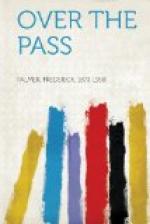“A Velasquez a few steps from here!” cried the Doge. “Where? Be exact, before I let my hopes rise too high.”
“The subject is an ancestor of mine. My father has it.”
Jack had looked in the direction of the Wingfield house on the Madison Avenue corner as he spoke, and the Doge had followed his glance. The eagerness passed from the Doge’s face, but not its intensity. That was transmuted into something staring and hard.
“A very great Velasquez!” Jack repeated.
“My amour propre!” the Doge said, in whispered abstraction, using the French which so exactly expresses the rightness of an inner feeling that will not let one do a thing however much he may wish to. Then a wave of confusion passed over his face, evidently at the echo of his thoughts in the form of words come unwittingly from his lips. He tried to retrieve his exclamation in an effort at the forensic: “The amour propre of any American is hurt by the thought that he must go to a private gallery to see a Velasquez in the greatest city of the land!”
But it was a lame explanation. Clearly, some old antipathy had been aroused in Jasper Ewold; and it made him hesitate to enter the big red brick house on the corner.
“And we have a wonderful Sargent, too, a Sargent of my mother!” Jack proceeded.
“Yes, yes!” said the Doge, and eagerness returned; a strange, moving eagerness that seemed to come from the same depths as the exclamation that had arrested his acceptance of the invitation at the outset. It held the monosyllables like drops of water trembling before they fell.
“I should like you to see them both,” said Jack.
“Yes,” said the Doge, the word an echo rather than consent.
“There is no one at home at this hour; you will have all the time you can spare for the pictures.”
In the ascendency of his ardor to retain the joy of their company and in the perplexity of mystery injected afresh into his relations with Mary, Jack was hardly conscious that his urging was only another way of saying that his father was absent. And Mary had not thrown her influence either for or against going. She was watching her father, curiously and penetratingly, as if trying to understand the source of the emotion that he was seeking to control.
“Why, in that case,” exclaimed the Doge, “why, you see,” he went on to explain, “we desert folk, though we are used to galleries, are a little diffident about meeting people who live in big mansions. I mean, people who have not had the desert training that you have had, Sir Chaps. If it is only a matter of looking at a picture without any social responsibilities, and that picture a Velasquez, why, we must take the time, mustn’t we, Mary?”
“Yes,” Mary assented.
With Mary on one side of him and Jack on the other, the Doge was walking heavily and slowly.
“At what period of Velasquez’s career?” he asked, vacantly.




